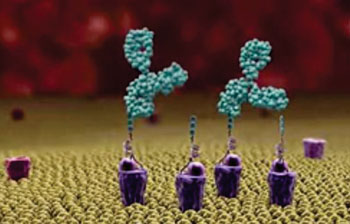DNA-Antibody Hybrid Molecule Shown to Be Effective Antibacterial Agent
|
By LabMedica International staff writers Posted on 18 May 2015 |

Image: Alphamers (purple) act as homing beacons, attracting pre-existing anti-alpha-Gal antibodies (green) to the bacterial surface (Photo courtesy of Altermune Technologies).

Image: Dr. Kary Mullis, founder of Altermune Technologies, received the Nobel Prize for chemistry in 1993 for his invention of the polymerase chain reaction (PCR) )Photo courtesy of Altermune Technologies).
A hybrid molecule comprising an aptamer attached to a trisaccharide terminating with alpha-gal (N-acetyl-glucosamine) was shown in a proof-of-principle study to be an effective antibacterial agent.
Aptamers are nucleic acid species that have been engineered through repeated rounds of in vitro selection to bind to various molecular targets such as small molecules, proteins, and nucleic acids. Aptamers are useful in biotechnological and therapeutic applications as they offer molecular recognition properties that rival that of antibodies. In addition to their discriminate recognition, aptamers offer advantages over antibodies, as they can be engineered completely in a test tube, are readily produced by chemical synthesis, possess desirable storage properties, and elicit little or no immunogenicity in therapeutic applications. Relative to monoclonal antibodies, aptamers are small, stable, and non-immunogenic.
Humans do not express the galactose-alpha-1,3-galactosyl-beta-1,4-N-acetyl-glucosamine (alpha-Gal) epitope. However, as a result of exposure to alpha-Gal in the environment, humans develop a large quantity of circulating antibodies that are specific for this trisaccharide.
Investigators at the University of California, San Diego (USA) developed a DNA aptamer that was able to bind to group A Streptococcus (GAS) bacteria by recognition of a conserved region of the surface-anchored M protein. To the 5′ end of this aptamer they conjugated an alpha-Gal epitope. This hybrid molecule was termed an "alphamer." The intent was that the aptamer segment of the alphamer would attach the molecule to the target bacterium while the alpha-Gal fragment would bind to the body's normally circulating anti-alpha-Gal antibodies.
In a paper published in the May 5, 2015, online edition of the Journal of Molecular Medicine the investigators showed that an anti-GAS alphamer could recruit anti-Gal antibodies to the streptococcal surface in an alpha-Gal-specific manner, elicit uptake and killing of the bacteria by human phagocytes, and slow growth of invasive GAS organisms in human whole blood.
These results constituted the first in vitro proof of concept that alphamers had the potential to redirect preexisting antibodies to bacteria in a specific manner and trigger an immediate antibacterial immune response.
"We are picturing a future in which doctors have a case full of pathogen-specific alphamers at their disposal," said senior author Dr. Victor Nizet, professor of pediatrics and pharmacy at the University of California, San Diego. "They see an infected patient, identify the causative bacteria, and pull out the appropriate alphamer to instantly enlist the support of the immune system in curing the infection."
The alphamer concept was attributed to contributing author Dr. Kary Mullis, winner of the 1993 Nobel Prize for chemistry for his invention of the polymerase chain reaction (PCR), technique. Dr. Mullis has established a biotech company, Altermune Technologies (Irvine, CA, USA), to develop alphamers into commercially viable therapeutic tools.
Related Links:
University of California, San Diego
Altermune Technologies
Aptamers are nucleic acid species that have been engineered through repeated rounds of in vitro selection to bind to various molecular targets such as small molecules, proteins, and nucleic acids. Aptamers are useful in biotechnological and therapeutic applications as they offer molecular recognition properties that rival that of antibodies. In addition to their discriminate recognition, aptamers offer advantages over antibodies, as they can be engineered completely in a test tube, are readily produced by chemical synthesis, possess desirable storage properties, and elicit little or no immunogenicity in therapeutic applications. Relative to monoclonal antibodies, aptamers are small, stable, and non-immunogenic.
Humans do not express the galactose-alpha-1,3-galactosyl-beta-1,4-N-acetyl-glucosamine (alpha-Gal) epitope. However, as a result of exposure to alpha-Gal in the environment, humans develop a large quantity of circulating antibodies that are specific for this trisaccharide.
Investigators at the University of California, San Diego (USA) developed a DNA aptamer that was able to bind to group A Streptococcus (GAS) bacteria by recognition of a conserved region of the surface-anchored M protein. To the 5′ end of this aptamer they conjugated an alpha-Gal epitope. This hybrid molecule was termed an "alphamer." The intent was that the aptamer segment of the alphamer would attach the molecule to the target bacterium while the alpha-Gal fragment would bind to the body's normally circulating anti-alpha-Gal antibodies.
In a paper published in the May 5, 2015, online edition of the Journal of Molecular Medicine the investigators showed that an anti-GAS alphamer could recruit anti-Gal antibodies to the streptococcal surface in an alpha-Gal-specific manner, elicit uptake and killing of the bacteria by human phagocytes, and slow growth of invasive GAS organisms in human whole blood.
These results constituted the first in vitro proof of concept that alphamers had the potential to redirect preexisting antibodies to bacteria in a specific manner and trigger an immediate antibacterial immune response.
"We are picturing a future in which doctors have a case full of pathogen-specific alphamers at their disposal," said senior author Dr. Victor Nizet, professor of pediatrics and pharmacy at the University of California, San Diego. "They see an infected patient, identify the causative bacteria, and pull out the appropriate alphamer to instantly enlist the support of the immune system in curing the infection."
The alphamer concept was attributed to contributing author Dr. Kary Mullis, winner of the 1993 Nobel Prize for chemistry for his invention of the polymerase chain reaction (PCR), technique. Dr. Mullis has established a biotech company, Altermune Technologies (Irvine, CA, USA), to develop alphamers into commercially viable therapeutic tools.
Related Links:
University of California, San Diego
Altermune Technologies
Latest BioResearch News
- Genome Analysis Predicts Likelihood of Neurodisability in Oxygen-Deprived Newborns
- Gene Panel Predicts Disease Progession for Patients with B-cell Lymphoma
- New Method Simplifies Preparation of Tumor Genomic DNA Libraries
- New Tool Developed for Diagnosis of Chronic HBV Infection
- Panel of Genetic Loci Accurately Predicts Risk of Developing Gout
- Disrupted TGFB Signaling Linked to Increased Cancer-Related Bacteria
- Gene Fusion Protein Proposed as Prostate Cancer Biomarker
- NIV Test to Diagnose and Monitor Vascular Complications in Diabetes
- Semen Exosome MicroRNA Proves Biomarker for Prostate Cancer
- Genetic Loci Link Plasma Lipid Levels to CVD Risk
- Newly Identified Gene Network Aids in Early Diagnosis of Autism Spectrum Disorder
- Link Confirmed between Living in Poverty and Developing Diseases
- Genomic Study Identifies Kidney Disease Loci in Type I Diabetes Patients
- Liquid Biopsy More Effective for Analyzing Tumor Drug Resistance Mutations
- New Liquid Biopsy Assay Reveals Host-Pathogen Interactions
- Method Developed for Enriching Trophoblast Population in Samples
Channels
Clinical Chemistry
view channel
Existing Hospital Analyzers Can Identify Fake Liquid Medical Products
Counterfeit and substandard medicines remain a serious global health threat, with World Health Organization estimates suggesting that 10.5% of medicines in low- and middle-income countries are either fake... Read more
Rapid Blood Testing Method Aids Safer Decision-Making in Drug-Related Emergencies
Acute recreational drug toxicity is a frequent reason for emergency department visits, yet clinicians rarely have access to confirmatory toxicology results in real time. Instead, treatment decisions are... Read moreMolecular Diagnostics
view channel
New Extraction Kit Enables Consistent, Scalable cfDNA Isolation from Multiple Biofluids
Circulating cell-free DNA (cfDNA) found in plasma, serum, urine, and cerebrospinal fluid is typically present at low concentrations and is often highly fragmented, making efficient recovery challenging... Read more
AI-Powered Liquid Biopsy Classifies Pediatric Brain Tumors with High Accuracy
Liquid biopsies offer a noninvasive way to study cancer by analyzing circulating tumor DNA in body fluids. However, in pediatric brain tumors, the small amount of ctDNA in cerebrospinal fluid has limited... Read moreHematology
view channel
Rapid Cartridge-Based Test Aims to Expand Access to Hemoglobin Disorder Diagnosis
Sickle cell disease and beta thalassemia are hemoglobin disorders that often require referral to specialized laboratories for definitive diagnosis, delaying results for patients and clinicians.... Read more
New Guidelines Aim to Improve AL Amyloidosis Diagnosis
Light chain (AL) amyloidosis is a rare, life-threatening bone marrow disorder in which abnormal amyloid proteins accumulate in organs. Approximately 3,260 people in the United States are diagnosed... Read moreImmunology
view channel
New Biomarker Predicts Chemotherapy Response in Triple-Negative Breast Cancer
Triple-negative breast cancer is an aggressive form of breast cancer in which patients often show widely varying responses to chemotherapy. Predicting who will benefit from treatment remains challenging,... Read moreBlood Test Identifies Lung Cancer Patients Who Can Benefit from Immunotherapy Drug
Small cell lung cancer (SCLC) is an aggressive disease with limited treatment options, and even newly approved immunotherapies do not benefit all patients. While immunotherapy can extend survival for some,... Read more
Whole-Genome Sequencing Approach Identifies Cancer Patients Benefitting From PARP-Inhibitor Treatment
Targeted cancer therapies such as PARP inhibitors can be highly effective, but only for patients whose tumors carry specific DNA repair defects. Identifying these patients accurately remains challenging,... Read more
Ultrasensitive Liquid Biopsy Demonstrates Efficacy in Predicting Immunotherapy Response
Immunotherapy has transformed cancer treatment, but only a small proportion of patients experience lasting benefit, with response rates often remaining between 10% and 20%. Clinicians currently lack reliable... Read moreMicrobiology
view channel
Rapid Test Promises Faster Answers for Drug-Resistant Infections
Drug-resistant pathogens continue to pose a growing threat in healthcare facilities, where delayed detection can impede outbreak control and increase mortality. Candida auris is notoriously difficult to... Read more
CRISPR-Based Technology Neutralizes Antibiotic-Resistant Bacteria
Antibiotic resistance has accelerated into a global health crisis, with projections estimating more than 10 million deaths per year by 2050 as drug-resistant “superbugs” continue to spread.... Read more
Comprehensive Review Identifies Gut Microbiome Signatures Associated With Alzheimer’s Disease
Alzheimer’s disease affects approximately 6.7 million people in the United States and nearly 50 million worldwide, yet early cognitive decline remains difficult to characterize. Increasing evidence suggests... Read morePathology
view channel
Single Sample Classifier Predicts Cancer-Associated Fibroblast Subtypes in Patient Samples
Pancreatic ductal adenocarcinoma (PDAC) remains one of the deadliest cancers, in part because of its dense tumor microenvironment that influences how tumors grow and respond to treatment.... Read more
New AI-Driven Platform Standardizes Tuberculosis Smear Microscopy Workflow
Sputum smear microscopy remains central to tuberculosis treatment monitoring and follow-up, particularly in high‑burden settings where serial testing is routine. Yet consistent, repeatable bacillary assessment... Read more
AI Tool Uses Blood Biomarkers to Predict Transplant Complications Before Symptoms Appear
Stem cell and bone marrow transplants can be lifesaving, but serious complications may arise months after patients leave the hospital. One of the most dangerous is chronic graft-versus-host disease, in... Read moreTechnology
view channel
Blood Test “Clocks” Predict Start of Alzheimer’s Symptoms
More than 7 million Americans live with Alzheimer’s disease, and related health and long-term care costs are projected to reach nearly USD 400 billion in 2025. The disease has no cure, and symptoms often... Read more
AI-Powered Biomarker Predicts Liver Cancer Risk
Liver cancer, or hepatocellular carcinoma, causes more than 800,000 deaths worldwide each year and often goes undetected until late stages. Even after treatment, recurrence rates reach 70% to 80%, contributing... Read more
Robotic Technology Unveiled for Automated Diagnostic Blood Draws
Routine diagnostic blood collection is a high‑volume task that can strain staffing and introduce human‑dependent variability, with downstream implications for sample quality and patient experience.... Read more
ADLM Launches First-of-Its-Kind Data Science Program for Laboratory Medicine Professionals
Clinical laboratories generate billions of test results each year, creating a treasure trove of data with the potential to support more personalized testing, improve operational efficiency, and enhance patient care.... Read moreIndustry
view channel
QuidelOrtho Collaborates with Lifotronic to Expand Global Immunoassay Portfolio
QuidelOrtho (San Diego, CA, USA) has entered a long-term strategic supply agreement with Lifotronic Technology (Shenzhen, China) to expand its global immunoassay portfolio and accelerate customer access... Read more


















